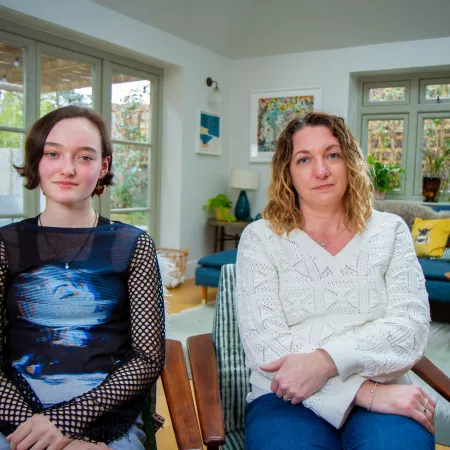
Asking me about my mental health
Tips from young people living with epilepsy about how to check in with them and their mental health, whether you're a friend or a professional supporting them.
Self-worth is how you value yourself, it’s also easily bruised, because it can be the hardest thing to protect.

Self-worth or self -esteem is the greatest things you can ever have. It celebrates everything that makes you unique. It’s how you value yourself. It’s also easily bruised, because it can be the hardest thing to protect. You see, you’re the only one in control of your self-worth. Yet you’ might be your own worst critic. And how you rate your self-esteem depends highly on your mental wellbeing.
Epilepsy is unpredictable. It changes your perceptions and how you feel about yourself. You may feel less confident in your own skin, in your academic abilities, in your career or even your role in your family or as a friend. You may lack motivation, feel isolated and anxious. This is all very normal, because epilepsy can affect your self-worth. And low self-worth impacts every aspect of your life. It’s important to make the connection between how you feel about yourself and the part epilepsy plays in your self-assessment. That way you can start to boost your self-esteem. These are just a few examples of how epilepsy can lower your self-worth:
Other young people with epilepsy describe the impact on their mental well being as:
Be kind to yourself and don’t feel ashamed of your diagnosis.Young person living with epilepsy
Coming to terms with and accepting an epilepsy diagnosis is half the battle. Once you have done that, try not to let it hold you back from doing what you love.Young person living with epilepsy
Young people with epilepsy who responded to our survey told us:
52% of young people do not find it easy to talk about how living with epilepsy makes them feel
99% of young people said living with epilepsy has had an impact on their mental wellbeing
Value yourself by doing things that make you feel good, whether that be baking, having a bath, reading, doing some artwork or going for a walk. Also, do things you're good at! By doing things you're good at and enjoy, this will boost your esteem and in turn, your self-worth.
Comparison is the thief of joy. You are unique so don't value yourself based on how perceive others.
Talk to yourself like you would a friend. Try not to listen to the negative voice on your shoulder and focus on what you’re good at instead. Praise yourself for your achievements and recognise that you should be valued.
As recommended by one of our young reps, follow Instagram accounts with positive quotes and posts for self-love, self-worth and positivity. Search for hashtags such as:
#epilepsyquotes #epilepsyawareness #epilepsy #epilepsystrong
This will help increase your self-worth and may also help you connect with others.
Leave a journal or paper close by somewhere where you will see it as soon as you wake up. Choose 1-3 positive affirmations (statements) that feel right for that day.
For example: I am strong, I am capable, I am worthy.
Say them out loud or in your mind before carrying the piece of paper round with you for the rest of the day. You can make them specific to your seizures.
This doesn't have to be a huge challenge like running a marathon. Start by setting yourself small, achievable goals. Even daily goals. Ticking these off will give you a sense of achievement and may even spur you on to challenge yourself to do something more!
Know your physical and emotional limits and know when to say no! Work on being confident to look after number 1.
If you feel you are struggling with low self-worth, please contact your GP.
If you are struggling with your self-worth, remember, you are not alone.
Try downloading this app that young people recommend:
If you feel like you would like to talk to someone, reach out to one of the organisations below. There are people ready and waiting to support you:
Find further signposting and how you can receive support from Young Epilepsy.
Shout is a free, confidential and 24/7 text support service for anyone in the UK
To start a conversation, text PURPLE to 85258
‘Me and my daughter have epilepsy, just know that's your superpower. You've got this, keep smiling.’Throughout our #OnTopOfEpilepsy campaign, supporters shared messages of support

Tips from young people living with epilepsy about how to check in with them and their mental health, whether you're a friend or a professional supporting them.

Learn how young people with epilepsy can access mental health support, including where to find help and tips for starting the conversation.

Discover helpful tips for improving sleep quality, especially for those with epilepsy, from bedtime routines to creating a sleep-friendly environment.
A space for young people, aged 13+, who are living with epilepsy, for them to share, learn and find support.